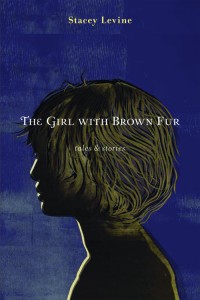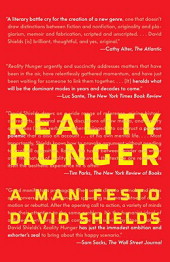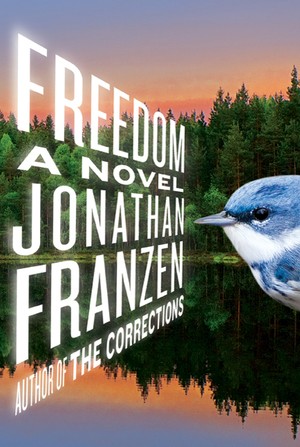Twitter MFA
In which we do a close-reading of a Tweeter’s Tweet draft and assess its tone, theme, synecdoche and narrative arc, among other things. Today’s Tweet draft was written by Colson Whitehead. Join us in two weeks for a discussion of a Tweet draft written by Drew Kalbach.
The Tweet draft:
This is one in a series of linked tweets about a small West Virginia mining town. Revolving narrators, characters in common, bittersweet.
It is not this Tweet draft alone that awes us, but the notion that Whitehead is mining the depths of his past in order to present to us a courageous work of Tweet. Whitehead, who hails from the small town of Manhattan, West Virginia, located in the Eastern Panhandle, is a Tweeter most capable of pulling off such a masterful rendition of the linked genre: the story-in-Tweets, an updating of the classic novel-in-stories genre we have seen so successfully employed by writers since Sherwood Anderson. Of Whitehead’s ambitious project, Hart Crane, who also has a highly visible social media presence, recently Tweeted: “@America should read @colsonwhitehead’s Tweets on her knees. They are an important update in the feed of her consciousness.” (Of course, it should be noted that this is Crane’s transparent ploy to get retweets from both Whitehead and America.)
The Girl with Brown Fur by Stacey Levine
 Couched within the strange fables in Stacey Levine’s latest story collection The Girl with Brown Fur are recognizable hurts and self-defeating desires. The way she writes about such things is what makes her fiction the elegant, precise and transcendent wonderland it is. For instance, in the story “The Girl,” the narrator sees a young girl on a leash in the hallway of a hotel, and determines to steal her. As we enter the mind of a child-abductor, we register the obsessive thinking, the cagey strategizing – it’s distasteful, ominous. Then a chance remarks reveals the narrator is a woman, one who has always nursed “the wish to transform into someone else, a different kind of body, to find another story in which to live.” Clearly she is appropriating the girl as way to do this, and the urge is as uneasily recognizable as it is licentious. The story plays with power dynamics in a new way – the animalistic qualities the narrator projects onto the girl (the one with brown fur) make a subtle point about exploitation but also tilt the story into poetry.
Couched within the strange fables in Stacey Levine’s latest story collection The Girl with Brown Fur are recognizable hurts and self-defeating desires. The way she writes about such things is what makes her fiction the elegant, precise and transcendent wonderland it is. For instance, in the story “The Girl,” the narrator sees a young girl on a leash in the hallway of a hotel, and determines to steal her. As we enter the mind of a child-abductor, we register the obsessive thinking, the cagey strategizing – it’s distasteful, ominous. Then a chance remarks reveals the narrator is a woman, one who has always nursed “the wish to transform into someone else, a different kind of body, to find another story in which to live.” Clearly she is appropriating the girl as way to do this, and the urge is as uneasily recognizable as it is licentious. The story plays with power dynamics in a new way – the animalistic qualities the narrator projects onto the girl (the one with brown fur) make a subtle point about exploitation but also tilt the story into poetry.
This is Levine’s genius – to make her points allusively, in an allegorical code, one that nevertheless always feels down-to-earth and revealing of very real pockets in the human psyche. In an interview included with the press package of her new collection, she says: “It wouldn’t mean anything to say outright: ‘He was feeling really anxious because he had always been criticized by his father.’ But it does mean something for me to tell how that would feel, to try to share that experience in a new way.” The technique she has developed for doing this leads her into sometimes surreal and hilarious allegories – about mass production work in a sausage factory (“Sausage”), for example, or a brother and sister who marry each other, with their parents’ approval, and incite wrath only when they want to move out of the family house.
May 12th, 2011 / 5:49 pm
Twitter MFA
In which we do a close-reading of a Tweeter’s Tweet draft and assess its tone, theme, synecdoche and narrative arc, among other things. Today’s Tweet draft was written by Daniel Bailey. Join us next Friday for a discussion of a Tweet draft written by Colson Whitehead.
The Tweet draft:
i will gain street cred by shit-talking all streets in my hood on yelp.com. current mood: ti holding a baby. future mood: unstoppable
In reading Daniel Bailey’s Tweets, the reader imagines that Bailey is binge-Tweeting drunk from his bathtub. If he were a reportage-style Tweeter, or (god forbid) a promo-Tweeter, these excessive Tweetouts wouldn’t work. But Bailey’s laissez-Tweet style is like messy hair that looks really fucking good. So we’ve often wondered how ‘hard’ is Bailey ‘trying’? Is he a pre-drafter? An off-the-cuffer? A hybrid? Regardless, the Tweet draft that Bailey sent us, to use academic jargon, is ‘da bomb.’
“The World Doesn’t Smell Like You,” from LOOK! LOOK! Feathers by Mike Young

This post, part of a series of short reactions to the stories from Mike Young’s really remarkable collection LOOK! LOOK! FEATHERS was written by Gabe Durham, who picked the story for Keyhole #10.—MS
“The World Doesn’t Smell Like You,” from Mike Young’s story collection LOOK! LOOK! FEATHERS, is a quest narrative about these high school dumbasses who need to know whether the rumor’s true that their gym teacher, Coach Schiel, has only got one ball.
It’s one of the L!L!F stories I got to read an early draft of, it’s the story I got to publish in Keyhole 10, and when in a certain mood, it’s my favorite story in the collection. Other favorites are “Susan White,” “Snow You Know,” “The Same Heart,” and “Burk’s Nub,” the latter a band-nerd companion to “The World” that underscores each high school clique’s unique potential for cruelty. READ MORE >
Snail Time: The Dreams of Dion McGregor
OK, so my buddy Jim turned me on to these (occasionally foul-mouthed) recordings of Dion McGregor. A while back McGregor wrote some songs, but was far better, it turns out, at talking in his sleep.
Thank god someone recorded him. I can’t stop listening to the things.
From the liner notes of McGregor’s first collected slumber recordings, “The Dream World of Dion McGregor”, which Ink Mathmatics wrote up a bit ago:
At a moment like this I wish that I were a writer so that I could properly explain what you will hear when you play the record inside this cover. Perhaps it would also help if I were a psychiatrist, a psychoanalyst, a clinical psychologist, a hypnotherapist, etc…etc… But since I am none of the above, i think it best that I simply report to you what I know about this record as the result of my work in connection with it.
About March of 1963 my wife, Nancy, came rushing into my office to tell me that she had just heard some tape recordings of a man by the name of Dion McGregor, who has a habit of “talking in his sleep”. Naturally I said, “go away wife, I’ve word to do.” She didn’t go away so I had to listen to her tell me all about McGregor’s “sleep talking habits…he tells crazy stories that are funny, terrify, serious and pathetic”, she said, “and he does this 3 and 4 times a week”. When she told me that Mike Barr, McGregor’s roommate, got up every morning (at 7:00) to turn on the tape recorder I was really upset, as obviously McGregor’s “talking habits” played havoc with Barr’s health. Then, to top it all, when she told me the “dreams” were coherent, naturally I had to agree to listen for myself. I listened and couldn’t believe my ears, and 150 tapes later I was still amazed. I found the subject matter fascinating, exciting, and with a touch of genius.
You can hear a bunch more on Grooveshark, too. Suggestions: “The Wagon”, “Snail Time”, “All Over Evelyn”.
Enjoy.
On “Pushcorpse”
 The experiment that was “Pushcorpse,” organized (and conceived?) by Shya Scanlon, is now published in No Colony 3. 65 writers all writing the same story, or rather pushing its corpse forward.
The experiment that was “Pushcorpse,” organized (and conceived?) by Shya Scanlon, is now published in No Colony 3. 65 writers all writing the same story, or rather pushing its corpse forward.
Reading it now, no longer as 1/65 of a contributor but just a casual reader, in its final No Colony resting place, what I found to be a curious aspect was that it served as a microcosm for the flow of memes. The one meme that holds on throughout is the Ginger meme. Remember that there was no obligation on the part of anyone to keep any character as a protagonist, yet Ginger continued to fill the role, despite efforts to kill her (often in grotesque description). Yet after she would die she would be back at the bar again a few paragraphs later. The plot summary seems to be Ginger at a bar while 65 people impose their will upon her, often killing her, but in doing so over and over again, keep her alive.
The whole work is an unusual example of metafiction. A reader is constantly aware of the struggle of too many people trying to direct the flow of something. There was meta-self-deprecation when writers felt the work as a whole was not meeting their expectations. The use of STOP became a meme as people became frustrated at the flow and wanted to abruptly change it. There is a moment when the meta element becomes literal (Ginger actually becomes one of the 65 and is trying to decide what to write) and from that point on, the work’s meta-ness becomes a meme and it all ends on this note.
Pleasing the Spiders OR Google: Oprah+[current event], Facebook
<head>
<meta name=”keywords” content=”search engines, better than people, angry writer, depression”>
<meta name=”description” content=”Who needs fans when you have Google?”>
</head>
<div id=”post”>
<h2>Pleasing the Spiders OR Google: Oprah + [current event], Facebook</h2>
<div id=”context”>
<p>Google’s index is made up of billions of web pages, making it the largest web page database, and possibly the largest knowledge repository, in the world. Google currently handles 70% of all search engine queries. As of October 2010 Google has scanned over 15 million books. The term “what to read” is searched 60,500 times monthly. What happens when humans are no longer necessary tastemakers? Being a hipster will no longer mean having access to early Domino and the Cheese Willys tracks. Being a hipster will mean having access to something–anything–not catalogued by Google. (Don’t panic, hipsters; I made up Domino and the Cheese Willys)</p>
<p>Search engines utilize top-secret algorithms to provide users with relevant information based on search terms. Anything online is susceptible to Google’s search spiders, which includes every story, every poem, every essay ever posted online. Is the next step in creative writing then to produce content with the search engine in mind? Will meta-data be its own keyword rich bank to be used as bait for inbound links? Will every other word be hyperlinked in hopes of attracting returning links? What will this do to our already dwindling attention span? Or, more optimistically, have our attention spans evolved to properly accept so much stimuli?</p>
<p>But despite the obvious cringe factor (ads in eBooks frightens me), I am less pessimistic about what will come from the first author to truly tap into the growing eBook medium. Think what Mark Z. Danielwski would have done with House of Leaves if the eBook platform was viably open for development. Until something big happens, though, I fear we will have to endure a lot of failed attempts (no hyperlink necessary; use your imagination).</p>
</div>
</div>
<div id=”footer”>
<p>This is a gust post by Caleb J Ross as part of his Stranger Will Tour for Strange blog tour. His goal is to post at a different blog every few days beginning with the release of his novel Stranger Will in March 2011 to the release of his second novel, I Didn’t Mean to Be Kevin in November 2011. If you have connections to a lit blog of any type, professional journal or personal site, please contact him. He would love to compromise your integrity for a day. To be a groupie and follow this tour, subscribe to the Caleb J Ross blog RSS feed. Follow him on Twitter: @calebjross. Friend him on Facebook: Facebook.com/rosscaleb.</p>
</div>
Three Types of Language: (Slogan, Fact and Thought Language)

There seems to be three types of language or ways of writing or speaking: slogan, factual and thoughtful.
Slogan: slogan language when a person speaks in cliches or ritualistic statements or as we say today, “talking points.” Cliché language can be found in romance or fantasy writing, and in most movies. We all know what cliches are, having scenes when two lovers are standing in the rain, having a life-affirming ending when the dying dad tells his kids that he loves them, the person who was evil the whole story breaks down and becomes a good person. There are a lot of abstract lines about ‘hearts’ and ‘souls.’
Heidegger called this ‘idle talk.’ Heidegger describes idle talk as gossip or that the talk has no Being, the Being of the talk is already disclosed. Which means what is said, does not matter and everyone knows it. And this essence of it not mattering makes people feel safe and secure.
I would say that slogan language/idle talk is talk is several things: first for the person who uses slogan language it is safe because they are speaking in commonly accepted parts of speech, that they assume are safe and normal. Second it makes the speaker feels like they are performing a ritual, that they are part of the society at large when they say these commonly used sentences. Third slogan speech is commonly connected with groups like political parties or social groups. The republican party currently has its phrase, “budget cuts.” A liberal might say, “Homosexuals have the right to marry.” A vegan might say, “Killing animals is wrong.” Christians will say, “God says abortion is wrong.” These are common slogans or talking points that these groups have. A follower of these groups carry these slogans like objects one would carry in their bookbag, when it is time, they take out the slogan and put it on the table for everyone to look it and say, “This slogan is me.”
The David Shields Interview (Paperback Edition)
 Flaubert claimed: “The value of a work of art can be measured by the harm spoken of it.” Reality Hunger, by David Shields, was one of the most controversial and talked-about books of 2010, reviewed nearly everywhere. Shields debated with journalists, writers, and artists such as Nicholson Baker, Simon Critchley, Leonard Lopate, John Cameron Mitchell, Rick Moody, Michael Silverblatt, Zadie Smith, DJ Spooky, Judith Thurman, and Simon Winchester. This past February saw the paperback release of Reality Hunger. Recently I met with Shields to analyze the polemics and decipher the carnage.
Flaubert claimed: “The value of a work of art can be measured by the harm spoken of it.” Reality Hunger, by David Shields, was one of the most controversial and talked-about books of 2010, reviewed nearly everywhere. Shields debated with journalists, writers, and artists such as Nicholson Baker, Simon Critchley, Leonard Lopate, John Cameron Mitchell, Rick Moody, Michael Silverblatt, Zadie Smith, DJ Spooky, Judith Thurman, and Simon Winchester. This past February saw the paperback release of Reality Hunger. Recently I met with Shields to analyze the polemics and decipher the carnage.
CALEB POWELL: The constructive response to Reality Hunger drowned, at times, amidst negative reviews. Walter Kirn said that he was “amused to see some of the hysterical reactions it’s provoked.”
DAVID SHIELDS: About negative reviews, the book is called a manifesto. It’s raison d’etre is to generate discussion. To provoke. I cannot object to any fiercely critical review. One reviewer said, “The discussion surrounding the book is more interesting than the book itself.” Well, what generated the discussion? My book.
CP: In their reviews…James Woods defended the traditional novel, and Michiko Kakutuni attacked.
DS: Neither of them talked about the book, they just mention it in passing. They are total spear carriers for conventional fiction…neither remotely engage with the argument. They mulch in a kind of drive by…Woods said something like…it’s good to be reminded of these arguments but Shields needs to define his terms better. Michiko called it “deeply nihilistic,” that’s so…
CP: It’s not the sharpest comment…it reads as hyperbole. I mean, you say the novel is worthless, but you praise a lot of art.
DS: She…and Woods, they are the megaphones of conventional fiction. The New York Times and The New Yorker, highly venerable institutions, whatever…they articulate nineteenth century conventional fiction…are you a Franzen fan?
On Listening to Franzen’s Freedom
 “To me, the point of a novel is to take you to a still place. You can multitask with a lot of things, but you can’t really multitask reading a book. You’re either reading a book or you’re not.” – Jonathan Franzen, “Jonathan Franzen on Author Videos & the Novel”
“To me, the point of a novel is to take you to a still place. You can multitask with a lot of things, but you can’t really multitask reading a book. You’re either reading a book or you’re not.” – Jonathan Franzen, “Jonathan Franzen on Author Videos & the Novel”
In August of last year, a publicist at Macmillan sent a 19-disc audiobook of Freedom by Jonathan Franzen to the newspaper office where I work. She included a handwritten note on Macmillan stationary, “I hope you’ll consider revisiting the pleasures of audiobook with FREEDOM.”
“Audiobooks are great when surfing the internet. You can surf; play games, chat, Skype … There are lots of other ways you can multitask with Audiobooks.” – Jia Hunter, “Multitask Away With Audiobooks”
“The review will be, like, about folding laundry while listening to Freedom, or taking a shit while listening to Freedom, or being on Facebook while listening to Freedom,” I said to my editor. He nodded, mumbled, “Clever,” and made a note in his daily planner.
My wife rolled her eyes when I told her about the review. “Always with this clever shit,” she said.
“And how are you going to take notes when you’re wiping your ass? And how are you going to quote from an audiobook if you’re not taking any notes?”
myeditor: yeah
no quotes is fine i guess
you’re going to slam him right?
me: that’s the idea
February 22nd, 2011 / 1:17 pm
